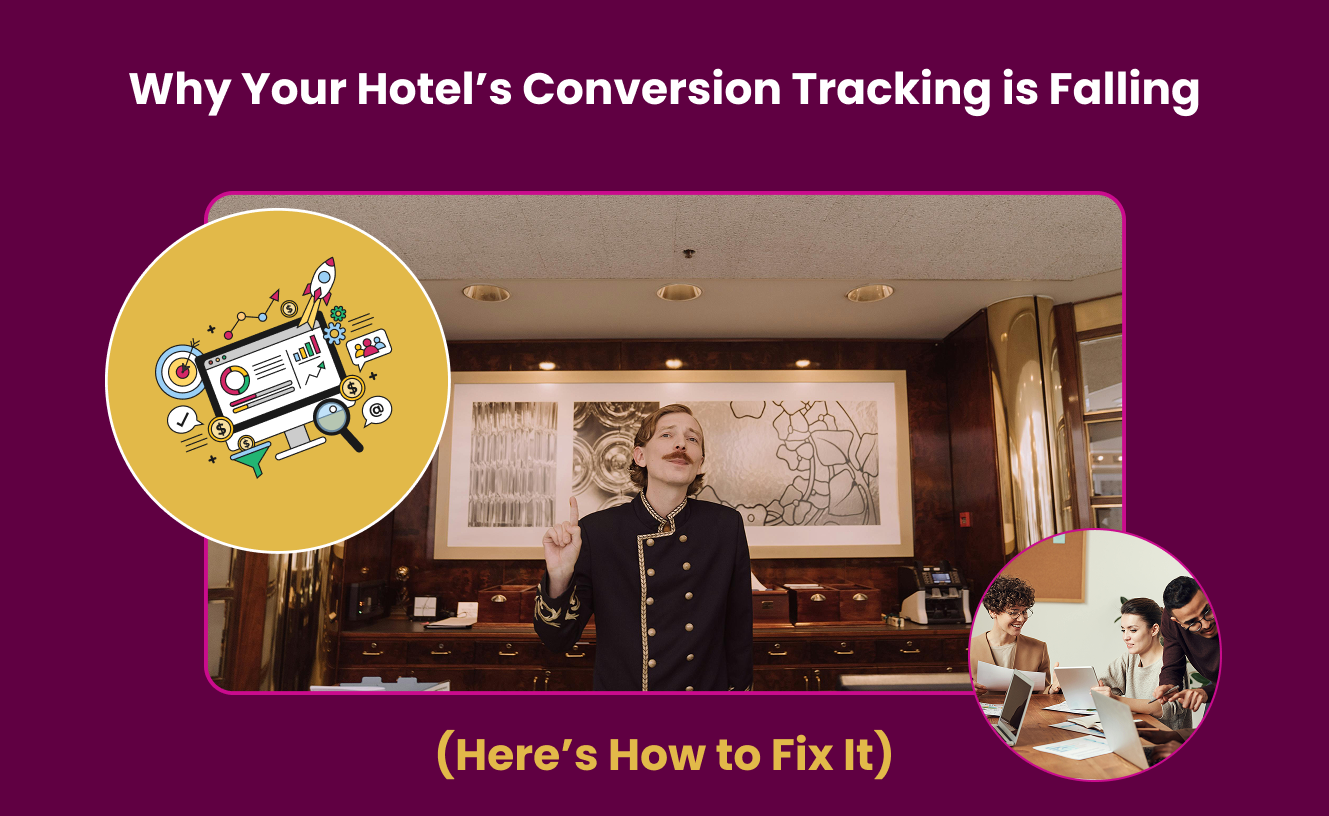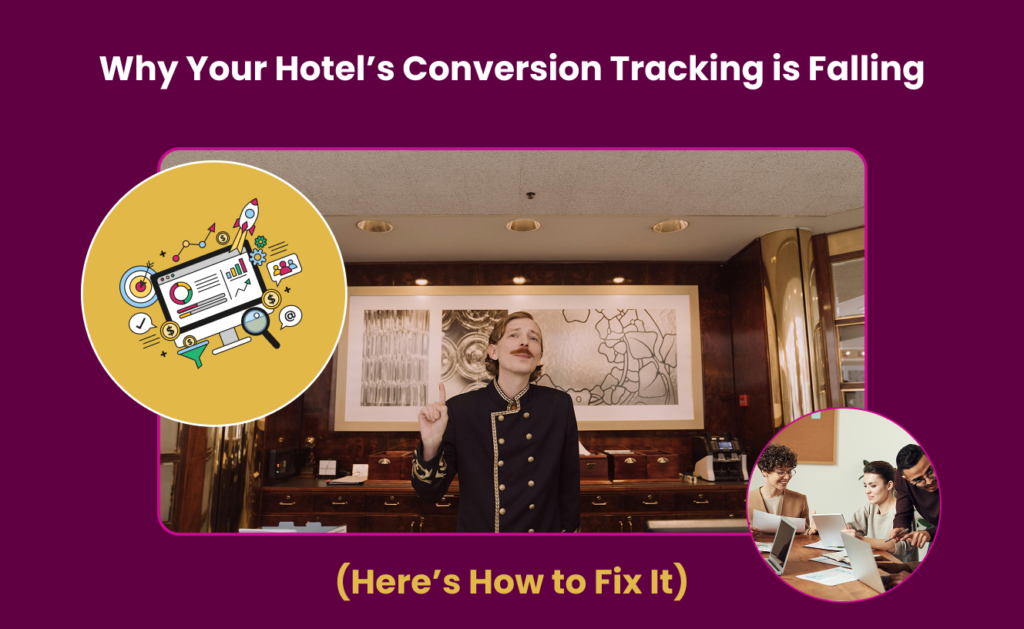Author: Shivendra Rawat
-

Why Your Hotel’s Conversion Tracking is Failing (And How to Fix It)

Imagine this – Your hotel’s marketing campaigns are running smoothly, your ads are live, and traffic is flowing to your website.Yet, when you check your bookings, the numbers don’t add up. What’s going wrong?
The culprit might be faulty conversion tracking.Understanding Conversion Tracking
Conversion tracking is like the GPS of your marketing efforts.
It tells you how many visitors complete desired actions—like booking a room or signing up for your promotions—after interacting with your ads.
Without accurate tracking, you’re essentially navigating in the dark, unsure if your strategies are leading to success or a dead end.Common Conversion Tracking Mistakes
1. No Conversion Tracking at All
Surprisingly, some hotels operate without any conversion tracking. This oversight means there’s no data to analyze, making it impossible to measure the effectiveness of your marketing campaigns.
Solution: Implement a robust conversion tracking system using tools like Google Analytics. Start by setting up goals that align with your business objectives, such as completed bookings or contact form submissions.
2. Not Tracking All Conversion Actions
Focusing solely on one type of conversion—like direct bookings—can cause you to overlook other valuable actions guests might take, such as signing up for newsletters or engaging with chatbots.
Solution: Identify and track all meaningful interactions on your website. This holistic approach provides a comprehensive view of guest engagement and potential revenue streams.
3. Tracking Non-Conversion Events as Conversions
Counting every click or page view as a conversion can inflate your data, making it seem like your campaigns are more successful than they truly are.
Solution: Define what constitutes a conversion for your hotel. Focus on actions that directly contribute to revenue or guest engagement, ensuring your data reflects true performance.
4. Incorrect Implementation of Tracking Codes
Misplaced or faulty tracking codes can lead to inaccurate data, causing you to make decisions based on misleading information.
Solution: Regularly audit your website’s tracking codes. Use tools like Google Tag Assistant to verify that all codes are correctly installed and firing as intended.
5. Ignoring Mobile Conversions
With the rise of mobile bookings, neglecting to track mobile conversions means missing out on a significant portion of data.
Solution: Ensure your tracking systems are optimized for mobile devices. This includes responsive design and mobile-specific tracking codes to capture all user interactions accurately.
Steps to Fix Conversion Tracking Issues
1. Conduct a Tracking Audit
Review all current tracking mechanisms on your website. Ensure that each is correctly set up and aligns with your marketing goals.
2. Implement Comprehensive Tracking
Beyond just bookings, track other valuable actions like newsletter sign-ups, social media shares, and contact form submissions. This provides a fuller picture of guest engagement.
3. Use Tag Management Systems
Tools like Google Tag Manager simplify the process of adding and managing tracking codes, reducing the risk of errors and ensuring consistency across your site.
4. Regularly Test and Update
Technology and user behaviors change. Regularly test your tracking systems to ensure they’re up-to-date and functioning correctly, adapting to any new trends or tools.
Conclusion
Accurate conversion tracking is the backbone of effective hotel marketing.
By avoiding common pitfalls and implementing precise tracking strategies, you’ll gain clearer insights into your campaigns, leading to informed decisions and, ultimately, more bookings.
Remember, in the world of hospitality, understanding your guest’s journey is key to providing exceptional experiences and driving success.
Happy Marketing!Team Plumfind
-

Will AI and ChatGPT take over your marketing job?

There was a hint of doubt in the air.
Will these new artificial intelligence (AI) tools such as ChatGPT take over all marketing jobs?
Well, you will always face these questions in your professional career as you move ahead and as the technology advances.
I have different thoughts on this topic,
I would say; instead, the more relevant question to ask is:
#How Will AI Enhance My Marketing Job?

Source: Adworld Conference 2023
At the recent Adworld Conference, Seth Godin addressed this issue and shared his thoughts on the potential impact of artificial intelligence on marketing jobs.
His assessment is simple:
If you’re a mediocre marketer working with a mediocre product, you should rework your skill set and increase your grip on marketing methods and strategies.
“AI is going to redefine what it means to be creative. If you’re mediocre at what you do, if your slogan is ‘you can pick anyone’…. you’ve always been doomed. And now you’re more doomed than ever.”
And he was not the only one. Here are what some of the other thought leaders are saying:
“AI and chatbots will not completely replace human marketers. While AI can take over some routine tasks like data entry, scheduling posts, etc., the creative and strategic aspects of marketing like content creation, branding, and campaign ideation still require a human touch.” – Neil Patel, co-founder of Crazy Egg and Hello Bar.
“AI and ChatGPT are here to stay. Marketers need to embrace them and learn how to use them effectively. However, they also need to be aware of the potential risks. For example, AI could be used to create fake news or to target people with harmful content. Marketers need to be vigilant and use AI responsibly.” – Mark Schaefer, author of “Marketing Rebellion”
In recent years, AI and natural language processing (NLP) technologies have made significant strides, and the sudden emergence of practical applications in writing and other creative tasks has led to a widespread fear that they will soon take over our jobs.
While it is true that AI and ChatGPT can perform certain marketing tasks with remarkable accuracy, it is important to understand that these technologies are not a complete replacement for human marketers.
Rather, they are tools that can be used to enhance the work of marketers and help them make better decisions.
And no matter what the rumors are, it is important to note that AI and ChatGPT are not substitutes for human creativity.
While they can help create personalized content, they lack the ability to create truly unique and imaginative content that can capture the attention of customers.
The key is for marketers to focus on developing skills and strengths that AI may never achieve – while also improving their AI literacy and ability to work with evolving technologies.
By mastering human-AI collaboration, marketers can stay ahead of the AI curve.
This is where human marketers can shine, using their creativity and ingenuity to create marketing campaigns that truly stand out.
Let’s illustrate this argument with an example:
Not too long ago, online shopping was not seen as a major economic activity. There was limited customer data to analyze. With the tremendous increase in the share of online shopping in the last few years, data availability is no longer an issue, but data analysis is. An ecommerce marketer may have been perfectly fine without a tool such as Google Analytics ten years ago, but today, it is an essential part of the marketer’s toolkit. Automated insights and AI-based reports in Google Analytics are not replacing marketers. These tools enhance the productivity of marketers.
This is just one example of how Artificial Intelligence can actually help marketers better understand their audience by analyzing tons of data and generating some conclusions and insights. It is still up to the marketer to use this advice and turn it into better campaigns.
In this constantly changing world, marketers have to understand that AI isn’t a threat but rather an opportunity.
By using the power of AI tools, marketers can work faster, get more out of their data, and give customers more personalized experiences. It is entirely possible that some of the marketing jobs will be completely automated. But if you upgrade your skills by becoming an advanced user of these AI tools, your skills as a marketer will be more in demand, not less.
A Pro Tip:
Invest in your creativity by truly understanding your audience and improve your productivity by embracing AI. If you can still tell a story that touches the hearts and minds of your customers, if you can show empathy and help your customers to get what they need or want, you will excel as a marketer in the coming years.
So don’t be fearful: learn more about AI and embrace these new technologies.
By understanding how people and AI work together, you will not only stay ahead of trends but also shape the future of marketing.
Thanks
About the author(s):
Shivendra is our Chief Marketing Officer. He has the astonishing ability to turn our client’s business objectives into well-crafted digital marketing plans. He continues to amaze us with his leadership skills and his lifestyle. Naturally, he has a mini-zoo at home consisting of three dogs, two cats, and a lizard. He lives in New Delhi, India.
Natasha is our Social Media Manager, a law student, and marketing enthusiast. She loves strategizing different methods to get results. A big fan of startups and their psychological aspects. She loves to travel and interact with locals to know the history of those places. She lives in Jaipur, India.




